#Great Omari Mosque
Explore tagged Tumblr posts
Text
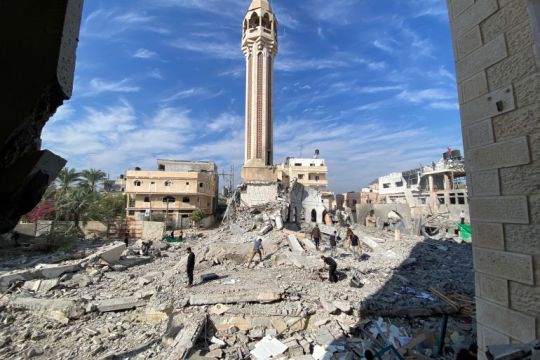
Hamas says Gaza mosque destroyed, urges UNESCO to save heritage The Great Omari Mosque has been reduced to rubble, with only its ancient minaret standing, according to images released by the Palestinian group.

The Othman bin Qashqar Mosque, also in Gaza City, was hit by air raids on Thursday, Hamas said. It also condemned the destruction of the Hammam al-Samara, the last Turkish-style bath in the territory, where Gaza Palestinians had bathed for more than 1,000 years. The Palestinian group, which has governed the Gaza Strip since 2007, said three churches had also been destroyed, including the 1,000-year-old Greek Orthodox Church of Saint Porphyrius, the oldest still active in the territory.
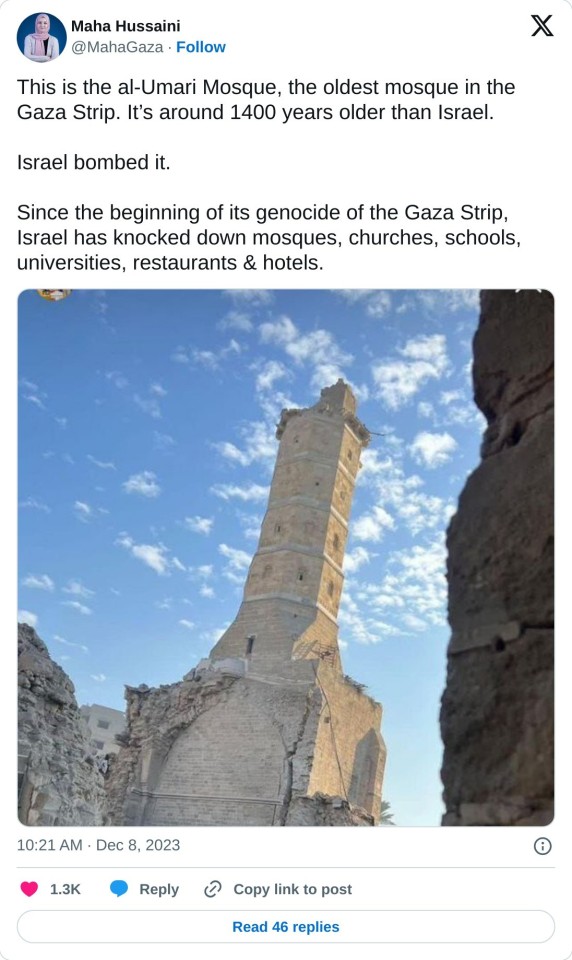
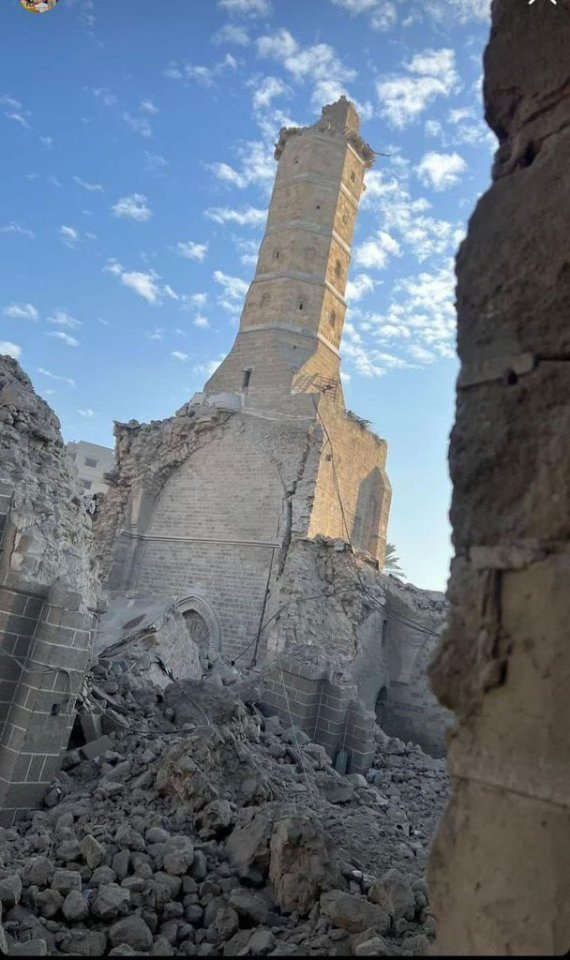
This is the al-Umari Mosque, the oldest mosque in the Gaza Strip. It’s around 1400 years older than Israel. Israel bombed it. Since the beginning of its genocide of the Gaza Strip, Israel has knocked down mosques, churches, schools, universities, restaurants & hotels. — Maha Hussaini (@MahaGaza) December 8, 2023
4K notes
·
View notes
Text
Since Israel began its assault on Gaza in the wake of Hamas’s October 7 attack, one of the most devastating architectural victims has been a historic, centuries-old mosque. Initially constructed as a Byzantine church in the fifth century, it became known as the Great Omari Mosque in the seventh century, the first-ever mosque to be established in Gaza during the period of Islamization. Gaza’s strategic coastal location has allowed it to bear witness to many changes: 11th-century Crusaders converted the mosque back into a church, which was converted to a mosque again a century later. The region has weathered much conflict, having played a role in many different empires. “Gaza was actually a sizable city under the Byzantines and, before them, the Romans, and was a [political] center…for the Mamluk Empire in the 13th through 15th centuries. And that’s when it probably reached its highest level of administrative power,” Nasser Rabbat, the director of the Aga Khan Program for Islamic Architecture at MIT, tells me. “Gaza was the place where the [Mamluk] army would congregate on the way to their campaigns in northern Syria, in the Euphrates region, or in Anatolia against its host of enemies.” The Great Omari Mosque reflected this history. It had been damaged and rebuilt many times over the centuries: attacked by the Mongols in the 13th century, battered by an earthquake a few decades later, restored and expanded in the Ottoman era, and partially destroyed by British bombs in World War I, only to be restored once more. Now it’s been effectively obliterated; only some walls and one minaret remain. This is—make no mistake—a deliberate element of the Israeli campaign to erase all traces of Palestinian life.
594 notes
·
View notes
Text



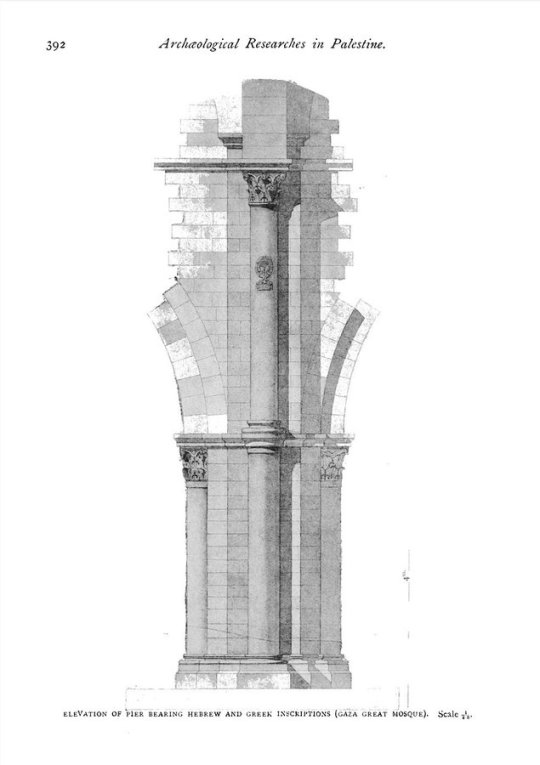

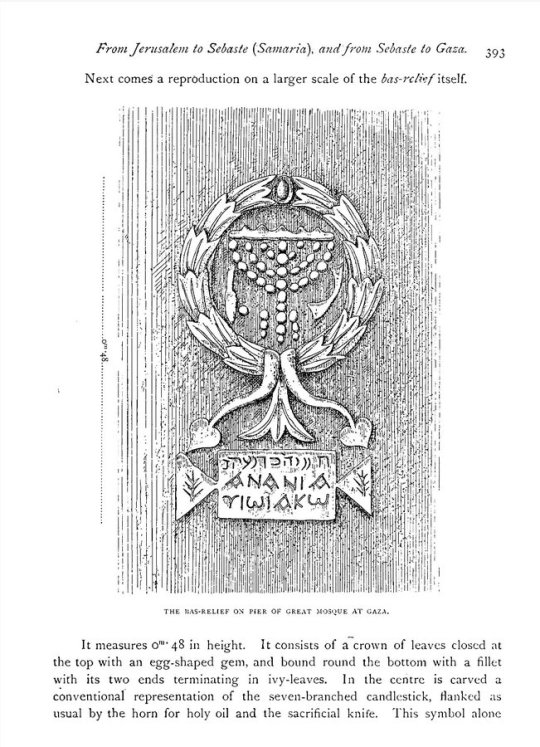


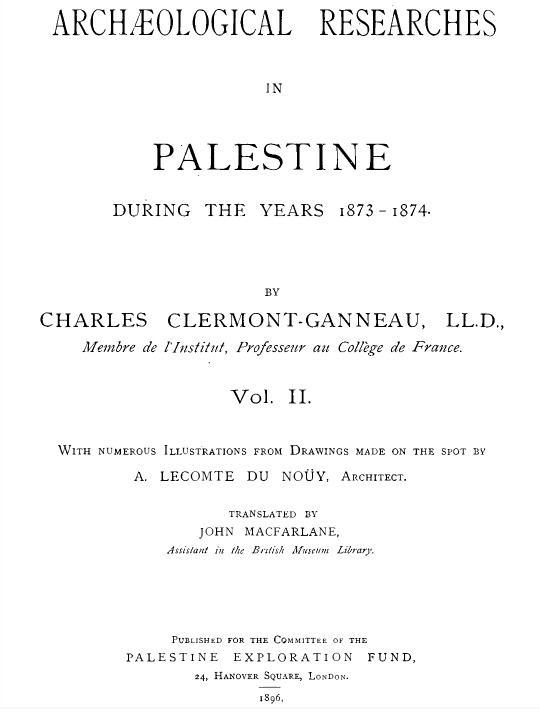

66 notes
·
View notes
Text
🇮🇱⚔️🇵🇸 🧨💥 🚨
💥ISRAELI OCCUPATION BOMBING DESTROYS 7TH CENTURY GREAT OMARI MOSQUE IN GAZA CITY💥
📹 The Israeli Occupation Forces (IOF), in its bombing campaign and genocide of Palestinians in the Gaza Strip, destroyed the 7th Century Great Omari Mosque in the Old City of Gaza.
Archeologists believe the Omari Mosque was once the ancient site of a Philistine temple, before the Byzantines erected a church on the site in the 5th century AD.
After the 7th Century Muslim conquest of the Levant, the church was transformed into the Great Omari Mosque known today.
The ancient mosque endured a major earthquake in the early 11th century which toppled its minaret but left the mosque standing. The mosque even survived the Crusades and several wars throughout the following centuries, only to be destroyed by Israeli bombing in the closing days of 2023.
#source
@WorkerSolidarityNews
#great omari mosque#mosque destroyed#mosque#palestine#palestine news#gaza#gaza strip#gaza news#gaza war#gaza genocide#israeli occupation forces#iof#israeli occupation#occupation#israel palestine conflict#conflict#war#war news#politics#news#geopolitics#middle east#world news#global news#international news#breaking news#current events#tragic news#israeli crimes#israeli war crimes
17 notes
·
View notes
Text
Perhaps no structure so exemplified the rich, interwoven history of Gaza as the Great Omari Mosque, believed by many to be the oldest in the territory. As empires waned, religious buildings on the site — first pagan, then Christian and Muslim — were destroyed or repurposed. The mosque was rebuilt many times, surviving not only as a beloved center for Islamic faith and learning, but also as a symbol of resilience.
In December, the mosque was all but destroyed in an airstrike by the Israeli military
0 notes
Text
3 March 2024
Graphic design artist Moataz Abu Sakran shares footage of the damage inflicted by the IOF on several famous mosques in north Gaza as Ramadan approaches. The first, Omari Mosque or the Great Mosque of Gaza, has been a religious site for over 3000 years, dating to the late-Bronze Age Philistine people. Religious buildings there have been destroyed many times. God willing, they will always be rebuilt.
instagram
#north gaza#gaza#gaza genocide#gaza strip#gaza under attack#free gaza#from the river to the sea palestine will be free#palestinian genocide#gaza journalists#video#moataz abu sakran#gaza under genocide#gaza under bombardment#gaza under fire#gaza under siege#end israel's genocide#Omari mosque#great mosque of Gaza#Gaza city#3 march 2024#Instagram
103 notes
·
View notes
Text
Israel has bombed—and completely demolished—the Great Omari Mosque in Gaza, which is the second oldest mosque in Palestine. There was no purpose to bombing it. There was no advantage to targeting it. Israel simply destroyed it to make a statement: that Palestinian religion and culture not only mean nothing to them, but are something they’re actively working on wiping out. This was one of Palestine’s most sacred cultural sites. Now it’ll forever serve as proof of the horrifying death and destruction the world has allowed to befall Palestine.
44K notes
·
View notes
Text

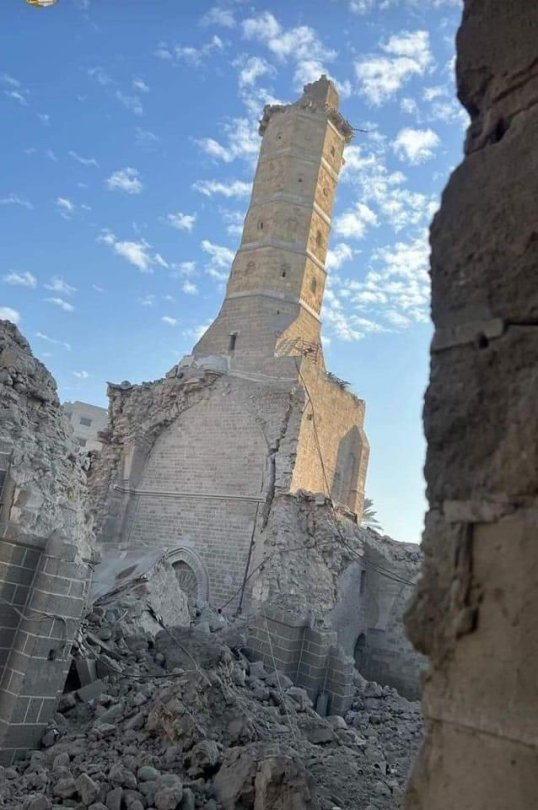
This is the Great Omari Mosque aleo known as the Great Mosque of Gaza, is Gaza’s oldest and largest mosque.
Here are some pictures before the destruction
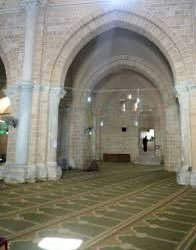


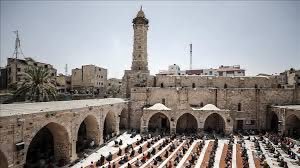
#yemen#jerusalem#tel aviv#current events#palestine#free palestine#gaza#free gaza#news on gaza#palestine news#news update#war news#war on gaza#islamic architecture#mosque
8K notes
·
View notes
Text
these are photos of Al-Omari Mosque, Gaza, taken six (6) months ago by local tour guide محمد ابو طه
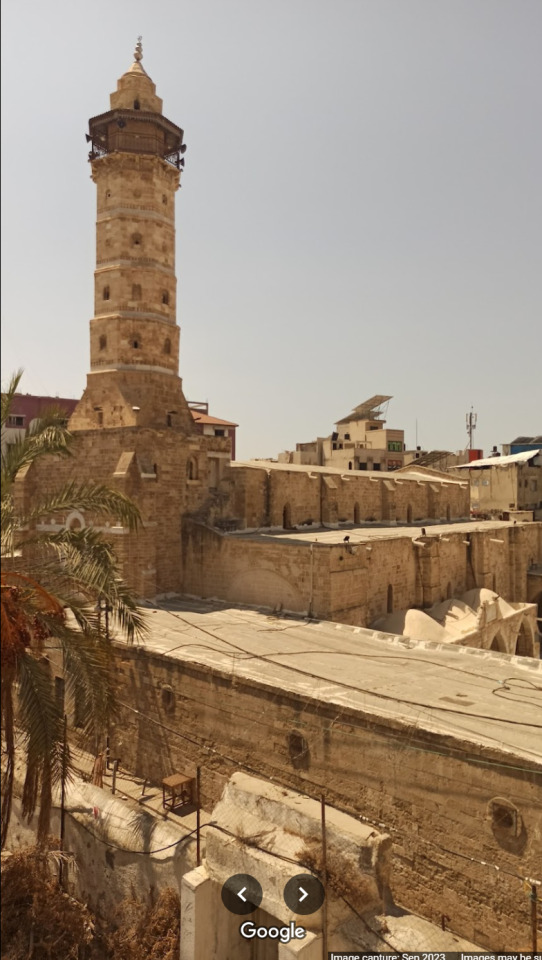

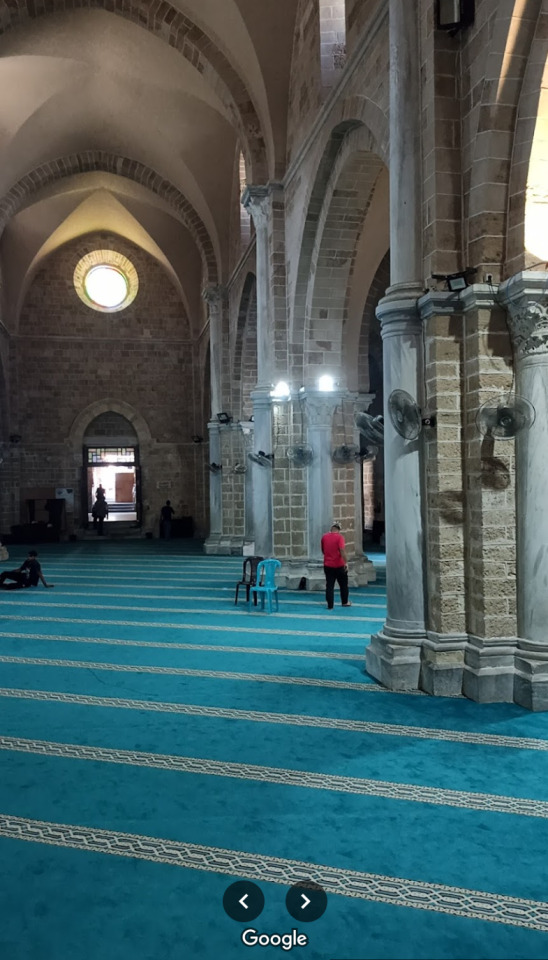
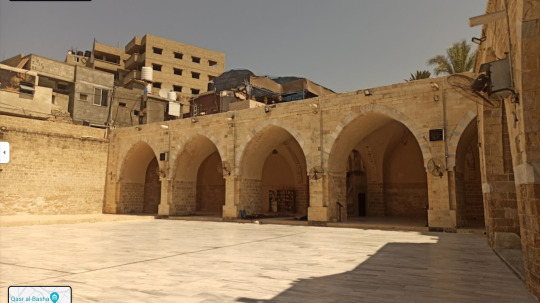
this is the same place as of December 8, 2023

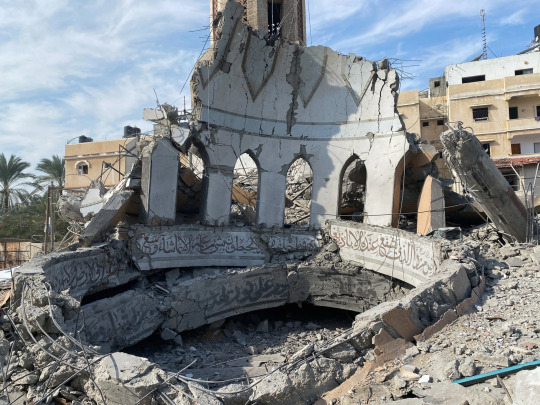
i take great interest in geography-related games and sometimes i open google maps and zoom into locations to help better my knowledge. while looking around the middle east, i found the top photos. afterwards, i looked the location up only to find out it had been destroyed. i've stated that i do not like, nor do i plan to go into politics, (i am quite young and feel that im not mature enough to fully understand them) but i really felt that i had to share this
#gaza#al-omari mosque#please tell me if the link works#free palestine#free gaza#🍉#🇵🇸#need to make it clear that i stand with palestine#unable to do much considering laws in my country and living situation#but i will share this
3K notes
·
View notes
Text
In the weeks since Hamas' Oct. 7 attack, Israeli airstrikes on the Gaza Strip have killed more than 15,000 Palestinians, according to Gaza's health ministry, and destroyed thousands of homes in the territory.
And there have also been tremendous losses to the region's ancient and globally significant cultural heritage. The region was a hub for commerce and culture under Egyptian, Greek, Roman and Byzantine rule. It remained influential for centuries thereafter.
A recent survey by the group Heritage for Peace details the damage done so far to more than 100 of these landmarks in Gaza since the start of the present conflict.
The casualties include the Great Omari Mosque, one of the most important and ancient mosques in historical Palestine; the Church of Saint Porphyrius, thought to be the third oldest church in the entire world; a 2,000-year-old Roman cemetery in northern Gaza excavated only last year; and the Rafah Museum, a space in southern Gaza which was dedicated to teaching about the territory's long and multi-layered heritage — until it was hammered by airstrikes early on in the conflict. (...)
"If this heritage be no more in Gaza, it will be a big loss of the identity of the people in Gaza," said Isber Sabrine, president of Heritage for Peace, in an interview with NPR. (...)
"The people in Gaza, they have the right to keep and to save this heritage, to tell the history, the importance of this land," he said.
The 1954 Hague Convention, agreed to by Palestinians and Israelis, is supposed to safeguard landmarks from the ravages of war. But landmarks in Gaza have been destroyed by Israeli strikes in earlier rounds of fighting. Dozens of sites, including the now-obliterated Great Omari Mosque, suffered damage in 2014. A report by UNESCO, the United Nations body that designates and protects World Heritage sites, cites further destruction to cultural and historic sites in Gaza in 2021. (...)
Destruction of historical sites and other cultural sites is part of genocide, it's the destruction of the proof of a people's relationship to the land and a horrible emotional blow at the community. UNESCO must act immediately against Israel's destruction of Palestinian heritage, and every country and international organism must expel Israel and impose sanctions to make the genocide and apartheid end.
#💬#palestine#gaza#israel#free palestine#world heritage#cultural heritage#historical sites#archaeology#cultures
2K notes
·
View notes
Text

photo of the Great Omari Mosque was referenced from the Palestine Information Center
255 notes
·
View notes
Text
This clip shows the devastation inflicted on Gaza's Great Omari Mosque by Israeli bombardment. Al-Omari is the second oldest mosque in Palestine after Al-Aqsa. It's a symbol of heritage and pride, embodying thousands of years of history in Gaza and Palestine. — Jehad Abusalim جهاد أبو سليم (@/JehadAbusalim) January 27, 2024
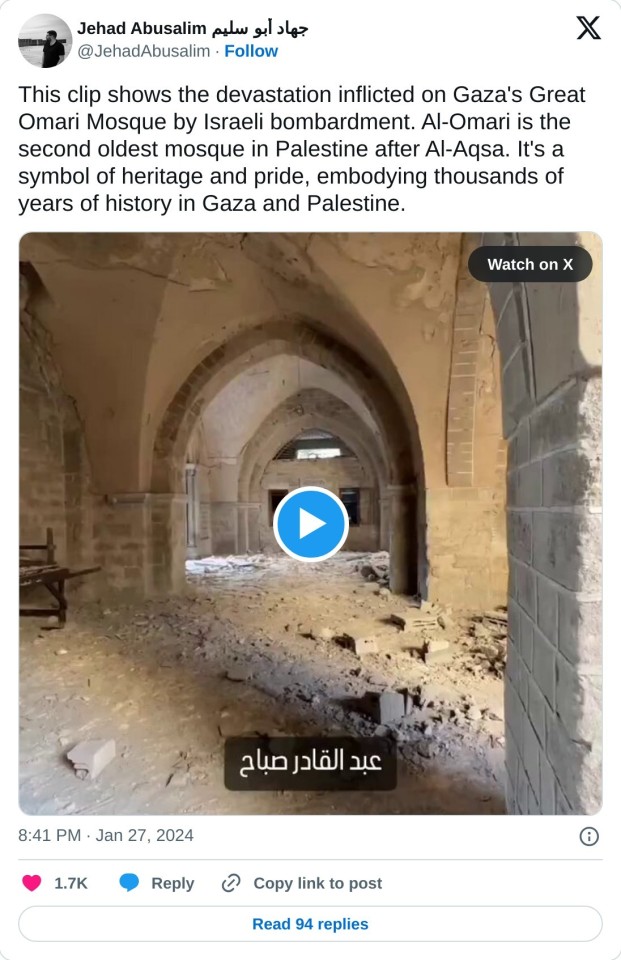
#from the river to the sea palestine will be free#free palestine free palestine free palestine#free palestine#palestine#gaza#great omari mosque#never forget
44 notes
·
View notes
Text
Gaza, that ancient city on the eastern shores of the Mediterranean, has come to be the political and moral compass of the entire world. Despite the pervasive destruction, Gaza stands not as a place in need of lessons. Instead, it is itself the poignant lesson of our modern age – a litmus test for humanity. As the death toll continues to rise, it becomes increasingly challenging to conceive of a violence more profound than that inflicted by machine guns and aerial bombardment. However, Israeli colonial violence – both in Gaza and Palestine more broadly – has historically manifested at various scales. It extends from the confines of a bedroom to encompass a neighbourhood, a whole city, and stretches to the scale of a regional geography. Understanding the destruction of Gaza calls for a dual perspective. It requires zooming in on the intimate scales of violence while also being aware of these broader manifestations. At the core of Israeli colonialism in Palestine is the logic of partition, a paradigm fundamentally at odds with the land, its people and its history. Gaza has long been a nexus of interconnected worlds: for millennia, it served as a vital crossroads, connecting Palestine to Egypt and bridging the continents of Asia and Africa. The roads from Gaza to Bir al‑Sabe’, Jaffa and Jerusalem have witnessed the passage of visitors, merchants and pilgrims from diverse corners of the world. The city’s social, cultural and economic prosperity has been woven into its geographical openness, a defining feature in Palestine’s long history. Any thought about Gaza and Palestine’s future is bound to reckon with this history. The enduring imprints of Gaza’s geographical openness are discernible in both its social and built fabrics. This ancient city has witnessed the rule of various empires and civilisations, including the Egyptian Pharaohs, Greeks, Romans, Byzantines and successive Islamic dynasties – each contributing to the rich tapestry of the city. Gaza is home to historic treasures such as the Anthedon Harbour, the port that linked the city to the Mediterranean world in the Roman era; the Great Omari Mosque, one of the most significant mosques in Palestine; and the Church of Saint Porphyrius, believed to be the third oldest church in the world. These historic landmarks, among residential buildings, universities, museums and cultural institutions, have not escaped the intentional targeting and destruction inflicted by Israel. In essence, these sites embody all that Gaza stands for and Zionism doesn’t – geographical openness and historical continuity. In historical terms, the 75 years of Zionist domination in Palestine represent an anomaly, as Gaza and other cities have perennially thrived on cultural diversity and interconnection.
112 notes
·
View notes
Text
One of the most important monuments in Palestine: The Israeli occupation bombed the Great Omari Mosque During its ongoing aggression against Gaza Strip!
The IOF bombed the Great Omari Mosque in Gaza City, the oldest and largest mosque in the Gaza Strip. It is one of nearly 200 mosques destroyed by the IOF since October 7th.
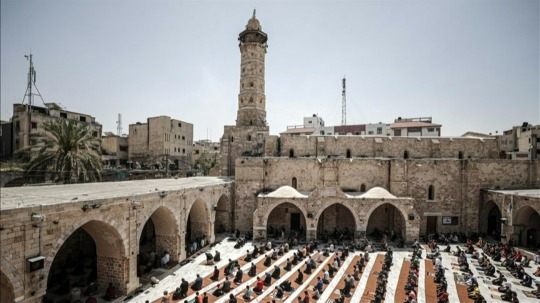
First built as a church in the 5th century, the mosque has undergone centuries of repeated renovations: destroyed by earthquakes in 1033 and 1260, by the Mongols in 1260, the British in 1925, and the IOF in 2023.

|
✍🏻: Resistance News Network.
#from the river to the sea palestine will be free#palestine#gaza strip#free palestine 🇵🇸#gazaunderattack#طوفان الأقصى#gazaunderfire#فلسطين#help gaza#غزة تحت القصف#palestinian martyrs#gaza under attack#free gaza#gaza#save gaza#gaza genocide#i stand with gaza#i stand with palestine#all the world stand with gaza#glory to all martyres#al aqsa flood#israel is a war criminal#israel is a terrorist state#fuck israel#حسبنا الله ونعم الوكيل#اللهم إنا مغلوبون فانتصرْ لنا#Israel targets innocent children and women in the Gaza Strip#israel is lying#israel is committing genocide#Israel destroys Gaza's mosques
216 notes
·
View notes
Text







Thus, the formerly beautiful old Gaza became destroyed, filled with sadness everywhere. This is the Great Omari Mosque, one of the largest and most famous ancient mosques known in it. It was restored the previous year, but it was barely destroyed.
#all eyes on us#fundraiser#donate#go fund them#gofunme#gofundme#all eyes on rafah#war on gaza#palestine#israel#free gaza#gaza genocide#gaza strip#gaza conflict#gaza#gaza fights for freedom#gaza gofundme#gaza under siege#gaza under bombardment#gazaunderattack#gaza aid#gaza fundraiser#gazaunderfire#help gaza#news on gaza#north gaza#save gaza#stand with gaza#palestinian genocide#all eyes on palestine
27 notes
·
View notes
Text
Israel and the west joined hands, have done all the evil, every form of violence, literally everything in their power to scare and break the Palestinians , have looted from them , their land their things their loved ones but they can NEVER snatch this - the incredible resilience and the amazing strength of the faith the Palestinians have ♥️
#free palestine#palestine#israel is a terrorist state#israel is an apartheid state#gaza#free gaza#israel is committing genocide#from the river to the sea palestine will be free#israel has lost#israel crimes#gazaunderattack#israel#more power to gaza
20 notes
·
View notes